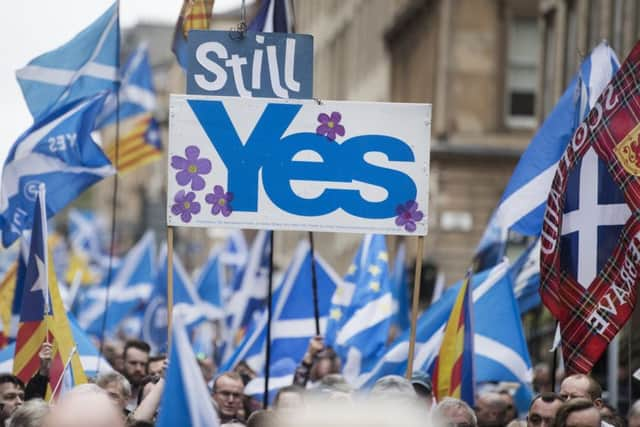John Curtice: Poll reveals many Scottish independence voters happy in UK
What we seemingly learn from this poll is there is a body of people who would like Scotland to be independent, but who would be quite happy if that could be consistent with Scotland remaining part of the UK. Even during the independence referendum, it often appeared the question that Scotland was asking itself was not just whether it wanted to be independent. Most people want Scotland to be politically independent, with a strong parliament of its own. Rather, the key question is whether or not it wishes to go so far as leaving the UK.
We should not be surprised if there are some people who would like Scotland to be independent, but as part of the UK – and that when we ask a different poll question that focuses on Scotland being in or out of the UK rather than on it becoming independent, some people give a different answer.


Advertisement
Hide AdAdvertisement
Hide AdDoes this mean that a different question should be asked in any second independence referendum? It might be argued the meaning of ‘leave the UK’ in the poll is not clear enough. If we follow the precedent established in 2014, setting the referendum question would be a decision for the Scottish Government rather than the UK government. The obvious thing for the Scottish Government to do would be to ask the exact same question as in 2014, which was tested and approved by the Electoral Commission.
The poll includes several questions about what sort of impact Brexit might have on support for independence. As has been found before, if you ask people such hypothetical questions, then by the time you ask them about leaving with no deal, you get very substantial movement towards independence. In this case, what was originally a 60-40 split in favour of remaining in the UK becomes just 52-48.
But beware of hypothetical questions. They invite people to focus on a particular element and in many respects they often tell you more about what people think of the condition they are being asked to take into account rather than their view of what the question is supposed to be about.
Presented with such a question, people who do not like leaving the EU will say ‘of course that means we should get out of the UK’. But whether they would actually vote that way is another matter. We should remember there were lots of poll questions before the February 2016 European Council summit to which people responded that if David Cameron came back with a piece of paper and said ‘it’s all fine, I’ve got a deal,’ they would vote Remain. But the polls did not move at all when he did come back with his deal.
On its own it is far from clear that leaving the EU will necessarily result in increased support for independence. What is more likely to matter is whether or not the economy goes pear-shaped as a result.
In the much milder question in the poll on whether the prospect of Brexit makes you more or less likely to vote for independence, the 15 per cent of No voters say they are more likely to do so are almost counterbalanced by 11 per cent of Yes voters who say they are less likely. These numbers suggest the impact of Brexit could be relatively small.
Indeed, previous polling has shown while some people who voted No in 2014 and Remain in 2016 have switched to Yes, they have been counterbalanced by a similar number of people who voted Yes and Leave who would now vote No.
It is thus somewhat surprising that, in the poll, people were more likely to say that Brexit was the more important issue than they were to state that independence was the bigger question. However, this may reflect the fact Brexit is what everybody is talking about at the moment while independence is not in the news.
Advertisement
Hide AdAdvertisement
Hide AdIn truth, most Leave voters are unlikely to swing behind independence if there is no Brexit deal. They think that leaving without a deal would be fine anyway. The group that it might help sway are some Remain voters, most of whom strongly dislike leaving without a deal.
However, we probably will not know before March whether such an outcome is going to happen. A government defeat on the meaningful vote will not automatically trigger no deal. If the government has not negotiated a successful deal by 21 January, it has to come to the House of Commons and say what it is going to do – and most MPs are opposed to no deal.
In the meantime, this poll suggests in an early general election Labour could lose five of its seven seats in Scotland. Jeremy Corbyn’s hopes of entering 10 Downing Street rest heavily on making gains in Scotland, but at the moment there is little evidence that he is likely to do so.
Sir John Curtice is Professor of Politics at Strathclyde University
